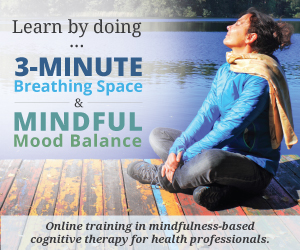Online Training for Teaching Mindfulness In Your Clinical Practice
 It was February in 2010, Sona and I were at the end of the fourth day of teaching together a five-day intensive training in MBCT. We were sitting in the lodge of the meditation retreat center in Joshua Tree, California enjoying the beauty, silence, and spaciousness of our surroundings and beginning to engage a question raised by participants in that workshop, like many before them and many to come: how do I carry all that I have learned back into my daily life and work setting? It is a common reaction among participants who have taken MBCT clinical workshops. It usually surfaces towards the end of the training and is expressed in questions such as ‘what comes next?’ or ‘how can I support my learning?’. As we reflected on these questions, we realized that some of the searching arose from the very natural apprehension about returning to solo practice after days of instructed group learning and returning to the hustle and bustle of daily life after engaging deeply the practices of MBCT in a retreat setting. At the same time, however, we also heard in these questions a desire for more support, guidance and community in their intention to integrate the skills and practices they had learned over the week. We began to wonder about ways in which we could support such intentions, building on what we could provide during in person workshops. How could we best support practitioners as they worked to strengthen the experiential and content learning that comes with personal practice and clinical implementation?
It was February in 2010, Sona and I were at the end of the fourth day of teaching together a five-day intensive training in MBCT. We were sitting in the lodge of the meditation retreat center in Joshua Tree, California enjoying the beauty, silence, and spaciousness of our surroundings and beginning to engage a question raised by participants in that workshop, like many before them and many to come: how do I carry all that I have learned back into my daily life and work setting? It is a common reaction among participants who have taken MBCT clinical workshops. It usually surfaces towards the end of the training and is expressed in questions such as ‘what comes next?’ or ‘how can I support my learning?’. As we reflected on these questions, we realized that some of the searching arose from the very natural apprehension about returning to solo practice after days of instructed group learning and returning to the hustle and bustle of daily life after engaging deeply the practices of MBCT in a retreat setting. At the same time, however, we also heard in these questions a desire for more support, guidance and community in their intention to integrate the skills and practices they had learned over the week. We began to wonder about ways in which we could support such intentions, building on what we could provide during in person workshops. How could we best support practitioners as they worked to strengthen the experiential and content learning that comes with personal practice and clinical implementation?
 The issue resurfaced in an interesting way, during our collaboration to develop an online version of Mindfulness Based Cognitive Therapy. We evaluated this digital version of MBCT – called Mindful Mood Balance - in a quasi-experimental open trial with 100 recovered depressed patients at Kaiser-Permanente Colorado and got promising results, Sona Dimidjian, S. Beck, A. Felder, J. Boggs, J. Gallop, R. & Segal. Z. (in press). Web-based Mindfulness-Based Cognitive Therapy for reducing residual depressive symptoms: An open trial and quasi-experimental comparison to propensity score matched controls. Behaviour Research and Therapy. We are continuing this work on extending MBCT for patients with a recently funded, larger definitive, randomized trial that we will conduct with recovered depressed patients reporting residual depressive symptoms (R01 – MH102229). As we developed Mindful Mood Balance, we began to realize that it was one way we might respond to the questions that were raised at the Joshua Tree retreat center in 2010. Mindful Mood Balance was built to teach patients explicitly some of the core skills of MBCT, but it also might be a valuable resource for clinicians who want to get the “feel” of the MBCT curriculum as it unfolds over time and who might benefit from the structure of an 8-week program in supporting their own practice of the core elements of MBCT. With this knowledge in mind, we also began to imagine other ways in which we could offer training to clinicians on some of the more subtle and challenging aspects of delivering MBCT. We built a program that taught therapists the detailed use of one of the core MBCT skills, the three minute breathing space, which they could use with their clients. We didn’t see either of these offerings as a replacement for in person training, but as another option in the array of treatment/ training resources, with distinct advantages of being able to learn from one’s home on one’s own schedule. .
The issue resurfaced in an interesting way, during our collaboration to develop an online version of Mindfulness Based Cognitive Therapy. We evaluated this digital version of MBCT – called Mindful Mood Balance - in a quasi-experimental open trial with 100 recovered depressed patients at Kaiser-Permanente Colorado and got promising results, Sona Dimidjian, S. Beck, A. Felder, J. Boggs, J. Gallop, R. & Segal. Z. (in press). Web-based Mindfulness-Based Cognitive Therapy for reducing residual depressive symptoms: An open trial and quasi-experimental comparison to propensity score matched controls. Behaviour Research and Therapy. We are continuing this work on extending MBCT for patients with a recently funded, larger definitive, randomized trial that we will conduct with recovered depressed patients reporting residual depressive symptoms (R01 – MH102229). As we developed Mindful Mood Balance, we began to realize that it was one way we might respond to the questions that were raised at the Joshua Tree retreat center in 2010. Mindful Mood Balance was built to teach patients explicitly some of the core skills of MBCT, but it also might be a valuable resource for clinicians who want to get the “feel” of the MBCT curriculum as it unfolds over time and who might benefit from the structure of an 8-week program in supporting their own practice of the core elements of MBCT. With this knowledge in mind, we also began to imagine other ways in which we could offer training to clinicians on some of the more subtle and challenging aspects of delivering MBCT. We built a program that taught therapists the detailed use of one of the core MBCT skills, the three minute breathing space, which they could use with their clients. We didn’t see either of these offerings as a replacement for in person training, but as another option in the array of treatment/ training resources, with distinct advantages of being able to learn from one’s home on one’s own schedule. .
The Three Minute Breathing Space Course, for example, teaches therapists how to deliver this practice, how to perform inquiry, how to make one’s own recordings and how to integrate the practice into daily life.
Therapists can also participate in a community of learners who are taking the course at the same time. Provided there is interest and benefit, our vision would be to build more contexts for learning responsive to what clinicians find challenging in delivering MBCT.
We have partnered with eLearning experts Brian and Traci Knudson in order to integrate clinical science and leading e-Learning technology, in courseware for health care professionals who want to enhance and enrich their clinical practice through delivering compassionate and effective mindfulness-based interventions. While it is still early days, we are curious to find out whether such modern / technological means can help support others in their use of these ancient / simple practices.

